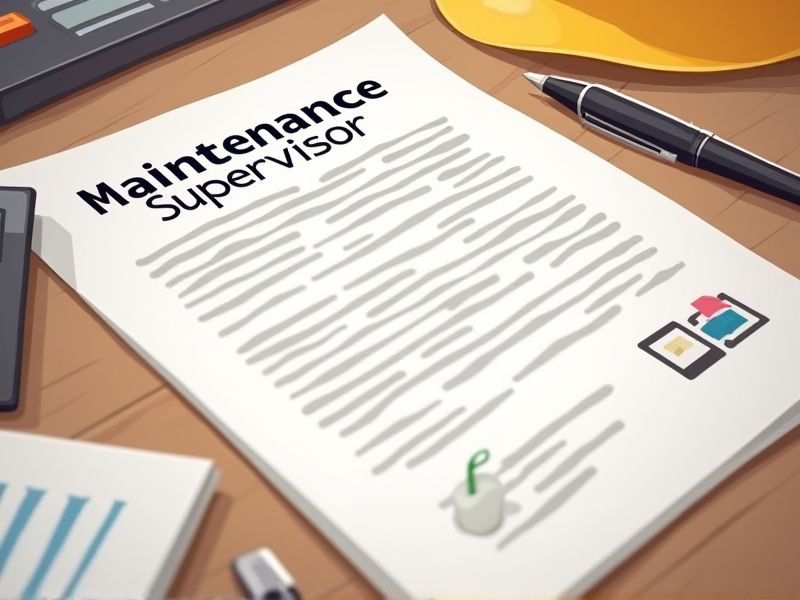
A Maintenance Supervisor plays a crucial role in managing and ensuring the operational efficiency of various systems. Certain certifications provide the technical knowledge and credibility needed to address complex equipment and safety regulations effectively. These certifications also demonstrate a commitment to professional development and adherence to industry standards. Here are some important certifications you may consider for a Maintenance Supervisor role.
Certified Maintenance & Reliability Professional (CMRP)
Earning the Certified Maintenance & Reliability Professional (CMRP) credential establishes a maintenance supervisor's expertise in best practices and standards in asset management, which is vital for optimizing equipment reliability. The certification provides validated, industry-specific knowledge that enhances decision-making and efficiency, ultimately leading to reduced downtime and maintenance costs. It signals a commitment to continuous improvement and professional growth, which can inspire confidence among team members and stakeholders. Data shows organizations with certified professionals often experience a positive shift in maintenance culture and productivity.
Certified Maintenance Manager (CMM)
A Certified Maintenance Manager (CMM) enhances a Maintenance Supervisor's credibility and demonstrates their commitment to industry standards, leading to increased trust among team members and management. Formal certification can elevate a supervisor's knowledge, resulting in improved maintenance efficiency and reduced equipment downtime. A CMM provides structured learning opportunities, which upskill supervisors and foster better problem-solving in complex maintenance scenarios. Industry recognition from a CMM often opens doors to career advancement, as it signifies proficiency and leadership in maintenance management.
Six Sigma Green Belt Certification
Achieving a Six Sigma Green Belt Certification equips maintenance supervisors with data-driven decision-making skills, which significantly enhance operational efficiency. Implementing Six Sigma methodologies often leads to a reduction in process variability, resulting in a decrease in equipment downtime and maintenance costs. Maintenance supervisors with Green Belt expertise tend to foster a culture of continuous improvement, driving more effective teamwork and problem-solving. Organizations observe a noticeable improvement in asset reliability and lifespan, contributing to improved overall productivity and maintenance success.
OSHA 30-Hour Safety Certification
The OSHA 30-Hour Safety Certification equips maintenance supervisors with in-depth knowledge of workplace safety standards, significantly reducing the risk of accidents and injuries. Improved safety awareness enhances regulatory compliance, preventing potential fines or legal issues. This certification also empowers supervisors to identify and address potential hazards proactively, fostering a safer working environment. Enhanced safety protocols can lead to increased productivity and employee morale, as workers feel more secure.
Facility Management Professional (FMP)
Engaging a Facility Management Professional (FMP) equips a Maintenance Supervisor with comprehensive insights into resource optimization, leading to cost-saving operational strategies. FMP training provides expertise in regulatory compliance, ensuring that maintenance practices align with current standards and avoid legal pitfalls. The data-driven approach of an FMP aids Maintenance Supervisors in predictive maintenance, reducing equipment downtime and extending asset life. Enhanced communication and leadership skills from FMP certification result in improved team coordination and efficiency in maintenance projects.
Lean Manufacturing Certification
Lean Manufacturing Certification provides Maintenance Supervisors with a structured framework to streamline operations and reduce waste, leading to more efficient maintenance processes. This certification equips them with skills to identify and eliminate non-value-added activities, directly affecting productivity positively. With the principles of lean, supervisors can better manage resources, enhancing the reliability and longevity of equipment. A certified supervisor is more likely to foster a culture of continuous improvement, driving overall operational excellence.
EPA Section 608 Certification (for HVAC)
EPA Section 608 Certification is mandated for maintenance supervisors to legally handle refrigerants, which are central to HVAC systems. The certification ensures that supervisors understand how to prevent refrigerant release, reducing environmental harm. Without certification, supervisors lack the authority to supervise or carry out tasks involving refrigerants, placing companies at risk of non-compliance with federal regulations. Employers prefer certified individuals to minimize liability and ensure adherence to environmental protection standards.
Industrial Maintenance Technician Certification
Industrial Maintenance Technician Certification provides a standardized foundation of skills, ensuring that Maintenance Supervisors have a deep understanding of equipment and procedures. Certification can increase the credibility and competence of a supervisor, fostering more trust and cooperation among team members. Knowledge from such certification helps in minimizing the risk of equipment failure and downtime, which directly impacts operational efficiency. Employers often prefer certified supervisors to reduce costly mistakes and improve overall safety compliance.
Root Cause Analysis Certification
Root Cause Analysis Certification equips a maintenance supervisor with the skills to effectively identify and address the underlying issues that cause equipment failures. Proper certification results in fewer recurring problems, as the supervisor can implement long-term solutions rather than just temporary fixes. Cost efficiency improves since identifying and solving root causes reduces unnecessary downtime and repair expenses. Improved reliability of equipment through proactive maintenance enhances overall plant productivity and safety.
First Aid/CPR Certification
A Maintenance Supervisor often works in environments with potential hazards, increasing the likelihood of accidents where first aid may be required. Being certified in First Aid/CPR ensures the supervisor can respond effectively to emergencies, potentially saving lives before professional medical help arrives. Certification also demonstrates a commitment to workplace safety, boosting team confidence and morale. Many companies require such certification as part of compliance with occupational health and safety regulations.
Summary
By acquiring certifications, you enhance your supervisory skills and increase credibility among your team. This leads to improved maintenance performance and higher efficiency standards. With validated expertise, you may drive operational cost savings and improve workplace safety. Your career prospects and advancement opportunities often expand significantly as a result.
